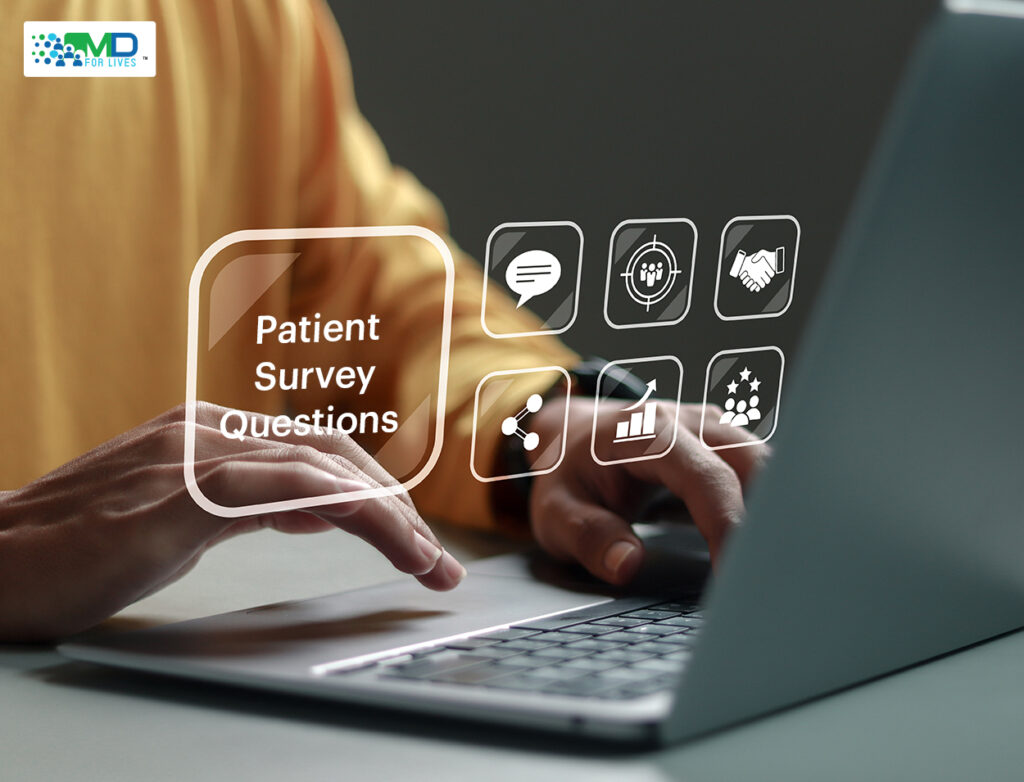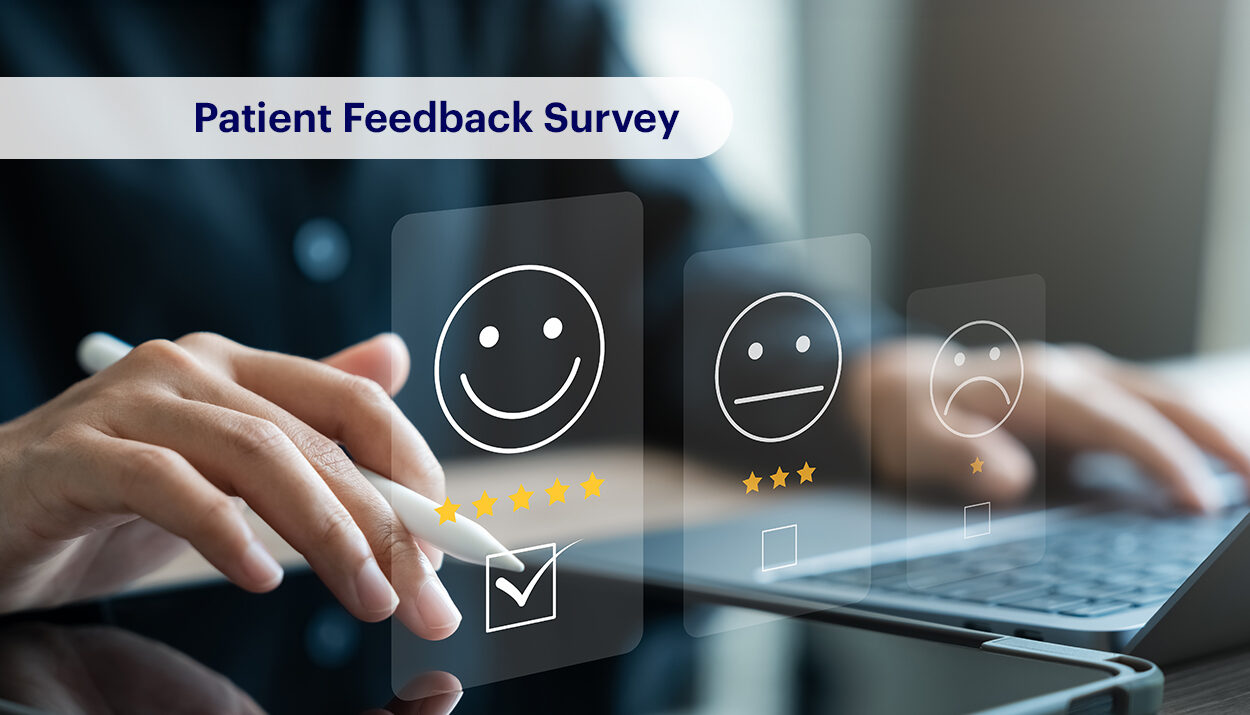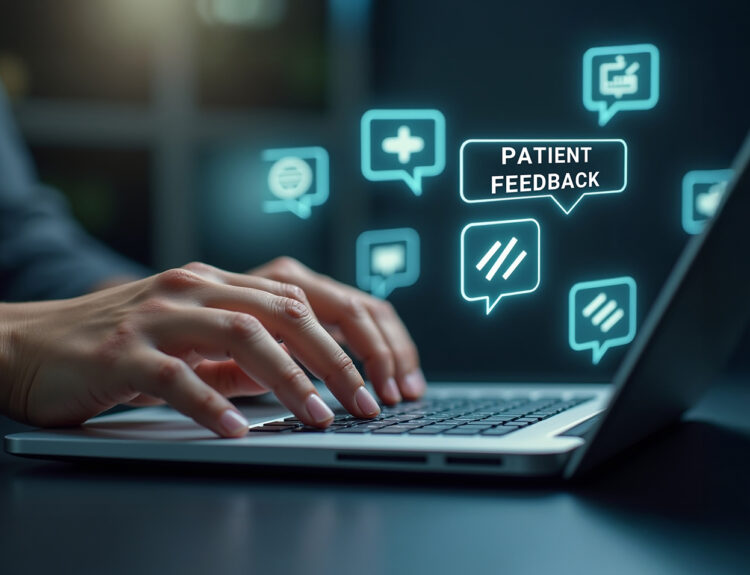After her visit to the hospital for a routine check-up, Jenny received a message asking her to fill out a patient feedback survey. At first, she wonders if it’s worth the time – what difference could her answers really make? But then she realizes: this survey is her chance to share what worked, what didn’t, and what could improve for the next patient.
A recent study found that 64% of patients would feel more inclined to choose a healthcare provider that actively uses patient feedback to improve care. This demonstrates a powerful truth: your voice doesn’t just matter – it shapes the future of healthcare delivery.
But how exactly does this work? Through platforms like MDForLives, this feedback is collected and used to make real changes. So, the next time you see a survey, remember that your voice truly matters.
Let’s learn more about patient feedback surveys!
How Patient Feedback Surveys Enhance Healthcare
You’ve probably seen them – patient experience surveys, that pop up after a doctor’s visit. But do you ever stop to think about what actually happens with your responses? When you fill out a survey, your answers aren’t just sitting there; they’re being used to make real, meaningful improvements in healthcare.

So, how exactly do patient surveys lead to medical breakthroughs and innovation? Let’s break it down and understand the importance of patient surveys:
- Spotting what needs attention: Think back to the last time you felt a treatment or healthcare approach wasn’t quite right. Maybe your doctor wasn’t listening closely, or the medication didn’t work as expected. Your feedback helps researchers pinpoint these issues. It guides them to focus on what’s truly impacting patients, not just what they think might be important.
- Making clinical trials more people-friendly: Have you ever thought about what happens in a clinical trial? Well, you’re not the only one. Patient surveys shed light on barriers and help researchers design trials that are easier to join, ensuring they’re more inclusive. The more accessible trials are, the better the research results.
- Shaping better treatments: By understanding symptoms, side effects, and unmet needs directly from patients, pharma and biotech companies can create better medicines and patient-centric therapies.
- Seeing how care works in the real world: When you share your symptoms, side effects, or things you wish were better, you’re directly influencing how new treatments are developed. Pharma companies rely on this real-world feedback to tweak their medicines, making sure they’re not just effective but tailored to patients like you.
- Seeing how treatments work in the real world: Clinical trials give us data, but the real-world experience is where the true test happens! Your responses help healthcare professionals understand how treatments are working outside the clinic. Are there side effects that don’t show up in trials? Your feedback helps answer these questions, improving care for everyone.
- Getting rewarded for your time: Let’s be honest – no one likes filling out forms for free! That’s why many survey platforms, like MDForLives, reward you with gift cards or cash. You’re not just helping improve healthcare; you’re also getting something back for your time and effort. Pretty fair, right?
- Improving communication during visits: Ever walked out of a doctor’s appointment feeling like you didn’t understand anything? Maybe you had questions but didn’t know how to ask. Surveys bring this to light! When patients speak up about communication issues, healthcare providers can work on improving how they explain things and ensure visits are more informative for everyone.
So, as one can see, patient feedback in healthcare goes beyond just improving treatments. Ultimately, patient surveys empower both providers and patients to work together for better outcomes and a more patient-centered healthcare environment.
What to Expect When Filling Out a Patient Feedback Survey
Filling out a patient experience survey may seem like just another formality, but it’s much more than that! Even one person’s experience can spotlight blind spots in the system, and these surveys help bring those stories to light.
So, what should patients expect when asked to fill one out? Let’s take a look!
1. Common questions

Patient surveys can include all kinds of questions, each designed to better understand the experience. Common questions might include:
- How would you rate the quality of care you received?
- Did you experience long wait times?
- How would you rate your staff interactions?
- Were the facilities clean and comfortable?
2. Survey length and format
If you’re wondering whether these surveys can fit into a patient’s schedule, there’s no need to worry! They are designed to be quick and easy to complete and can easily fit into a busy day without taking up too much time.
Here’s what can be expected in terms of length and format:
- Survey duration: Typically takes between 5 and 20 minutes to complete.
- Delivery methods: Can be provided online, in person, or via email.
- Format: Includes multiple-choice questions, rating scales (1-5 stars), and sometimes open-ended questions to allow more detailed feedback.
3. Confidentiality and privacy
One of the main concerns when filling out any healthcare survey is privacy, and patient surveys are no different! Knowing that a patient’s personal information and feedback are kept safe is important.
Here’s how confidentiality is maintained:
- HIPAA, CCPA, and GDPR compliance: Patient surveys usually follow strict data protection laws like HIPAA, CCPA, and GDPR. This ensures any personal information shared is securely handled and stored.
- Data protection: Responses are kept anonymous, ensuring the patient’s personal information is safe and secure.
- Trusted confidentiality: Providers go the extra mile to protect all feedback, using encrypted platforms, limiting access to authorized personnel only, and ensuring responses are only used to improve care.
Now that it’s clear how patient input helps shape better care, the next question is: “How can patients be sure their voices are being heard?”
MDForLives helps bridge that gap by offering a secure platform where patients’ insights directly influence healthcare improvements. The surveys not only reward patients for participation but also ensure the feedback supports better outcomes and patient care across the board.
Busting the Biggest Myths About Patient Surveys
There’s a lot of misinformation floating around about patient feedback surveys – many people assume they don’t actually change anything or that only certain kinds of feedback matter.
In fact, a study analyzing 717 healthcare surveys in Switzerland found that response rates ranged from 16.1% to 80%, with an average of just 49.8%.
This further proves that many patients aren’t engaging with patient experience surveys – likely because they don’t fully realize how valuable their input is!
So, what’s the truth? Patient surveys are much more powerful than most people give them credit for, directly shaping healthcare and improving patient’s experience.
That is why we need to tackle some of these myths head-on and clear up the confusion!
Myth 1: “Only negative feedback matters”
While negative feedback often gets the spotlight, positive responses are just as crucial! You can help healthcare providers understand what’s working well and provide an opportunity to build on success.
Myth 2” “Surveys are only for patients with serious issues”
This is NOT true at all! Whether it’s a routine visit or a quick check-up, feedback in a patient experience survey helps improve the overall quality of care, ensuring better experiences for all.
Myth 3: “Patient surveys don’t lead to immediate changes”
Although change doesn’t always happen overnight, patient feedback has a lasting impact. The insights gathered from these surveys lead to meaningful, long-term improvements in care, making a difference over time.
Myth 4: “Only doctors care about survey responses”
It’s not just doctors who benefit from feedback! Healthcare surveys are reviewed by a whole team, including nurses, technicians, and even administrative staff. Every department uses patient feedback to enhance the entire healthcare experience!
MDForLives: Where Patients Influence the Future of Care

Now that you’re ready to make an impact with your feedback, where do you start? It’s simple! Platforms like MDForLives give you the chance to contribute to real-time patient surveys that help shape treatment practices and medical research.
What makes it even better? The flexibility of course! You can complete surveys whenever convenient, making it easy to share feedback without interrupting your day. The best part is that you are rewarded each time you participate!
By engaging with patient surveys on MDForLives, you can help create better care for everyone!
Help Shape the Future of Healthcare – Start with a Simple Survey!
Even small pieces of feedback, whether about long wait times or how clear a doctor’s explanation was, can shape better care for everyone. That’s the real power of a patient feedback survey: it turns everyday experiences into insights that healthcare providers can act on!
While change doesn’t always happen overnight, it often starts with a single voice saying, “This could be better.” So, the next time a patient survey lands in your inbox, it’s worth remembering – this isn’t just about data. It’s about being heard!
Join MDForLives now and shape your own future in healthcare!
FAQs
-
How long does it typically take to complete a patient survey?
Most patient surveys are designed to be quick and easy, taking just a few minutes to complete. On average, they take about 5-20 minutes, depending on the level of detail in the patient experience survey.
-
What types of questions are usually asked in patient surveys?
Healthcare surveys typically ask about wait times, the quality of care, staff interactions, and overall patient satisfaction. Expect questions that help providers improve their services and make the healthcare experience smoother for everyone.
-
Are my survey responses anonymous?
Yes! Patient feedback surveys are built to protect privacy. Responses are generally anonymous, ensuring that personal details are kept confidential, especially in compliance with regulations like CCPA and GDPR.
-
What happens to my answers after I complete the survey?
After completing the survey, your answers are reviewed by the healthcare team. They use the feedback to identify areas of improvement and make meaningful changes, helping enhance overall patient care and healthcare services.

MDForLives is a vibrant community of healthcare professionals and patients dedicated to shaping the future of healthcare. We provide valuable global insights to healthcare companies through online surveys, interviews, and discussion forums.






